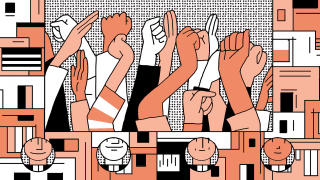Every year, 20 Jordanian women are killed because of “family honor.” The actual number is higher but their deaths are not officially recorded. Pressure by civil society organizations has failed to curb these crimes and attempts to change the laws that protect the perpetrators have also failed. Activists who oppose these crimes are accused of spreading “obscenity.”
The geography of the crime
Unofficial statistics of crimes committed between 2000 and 2010 reveal that the highest number of honor crimes, 37, were committed in the capital Amman, which is the least tribal and most civic city in Jordan and is mainly inhabited by Jordanians of Palestinian origin. Amman was followed by Irbid province (69 kilometers north of Amman) with 24 incidents. Irbid is composed of Jordanians and Palestinians and tends to be a civic city. The number of honor crimes drops in more tribal provinces, which are primarily composed of Jordanians from the east. According to the statistics, 13 honor crimes were committed in Karak province (120 km south of Amman), seven in Ma'an (216 km south of Amman) and two in Christian-majority Fuheis (8 km west of Amman). The remaining incidents related to honor crimes, which number about 200, were distributed throughout the kingdom.
The geographic distribution of honor crimes indicates that they are not associated with modernity or religiosity, nor with social or ethnic factors. The main reasons why the crime rate differed geographically were population density and police effectiveness. Honor crime incidents were high in the capital, where a third of the Jordan’s population lives and where there is an active police force. The number of incidents drops in less populated provinces that have a tribal culture and where they deal with honor crimes away from the police and the judiciary, for fear of stigma.
Honor first
Honor killings are caused by how society views women. A 2011 study titled “Cultural and Legal Discrimination Against Jordanian Girls” polled the country’s main population centers (the capital Amman, Zarqa, Irbid, Mafraq, Aqaba and Karak) and found that 80.9% of parents believe that protecting the female equates to protecting the family’s honor. The study revealed a shocking societal attitude toward women. Among those polled, 55% believed that a woman should be accompanied by her brother when she is outside the house; 66% are opposed to women having the same rights as a men of the same age with regard to being unaccompanied outside the house; 49% are opposed to a female child playing outside the house; and 29% say that all women should get married regardless of their education. According to the study, 29% of those polled said their convictions emanate from traditions, 25.1% said their convictions emanate from personal attitudes, 16% attributed their convictions to societal factors and 15.5% to religion.
The law and society protects the perpetrators
Jordanian law protects the perpetrators of honor crimes. The pressure exerted by civil society organizations is colliding with the legislature, which is preventing the law from being changed. In 2011, societal pressure forced Jordan’s parliament to backtrack on amending Article 76 of the temporary penal code whereby “the use of mitigating reasons for assault crimes” would have been abolished. This article protects the perpetrators of honor crimes who often benefit from mitigating reasons and avoid receiving a deterring punishment.
With regard to honor crimes, Article 340 of the Jordanian penal code lists the mitigating reasons for reducing the penalty. The article says that “he who discovers his wife, or one of his female ascendants or descendants or sisters with another in an unlawful bed and he kills, wounds or injures one or both of them, benefits from a penalty reduction.”
The law specifies the conditions under which a perpetrator is given a reduced sentence, specifying that there must be an element of surprise and the crime of adultery must be caught in the act. According to Article 97 of the penal code, if the mitigating conditions are present, then the penalty is reduced from execution or life imprisonment with the possibility of hard labor, to at least one year imprisonment. According to the same article, for any other crime the imprisonment shall be six months to two years, and if the crime is a misdemeanor then the punishment shall be imprisonment not exceeding six months or a 25-dinar fine.
Parliament’s refusal to drop reduced sentences for mitigating circumstances in honor crimes has made the courts more strict in determining the mitigating reasons, especially since most crimes do not fall under Article 340. A 2010 study conducted by the National Council for Family Affairs showed that 78% of criminals do not benefit from mitigating reasons. But then why are they not receiving a deterring punishment? According to the study, 70% of criminals benefit from the victim's family dropping its “private claim,” something which allows the perpetrator to get away with the minimum penalty. When the family drops its private claim it indicates its approval of the crime, which in 69% of the cases is committed by the victim’s brother.
The uprising
Activists for the “No Honor in Honor Killings” initiative have for years been expressing their opposition to honor crimes on social networking websites. They document the crimes and stories of the victims and criminals. However, they have made no progress after years of work and therefore decided to revolt. They demonstrated by forming a human chain, raising a banner saying “You Are Killing Us With Your Honor.” In both the real world and cyberspace they were met with insults accusing them of being “obscene,” yet they have not despaired.
Translated by Al-Monitor




